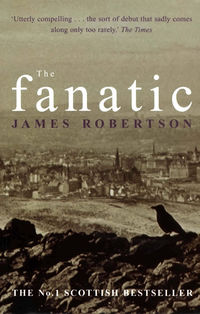
Полная версия
Joseph Knight
‘Aye we are,’ said Kinloch. ‘We maist certainly are. We hae to be. It’s the only honest way. If ye look at the thing true, ye’ll agree.’
Later, long after Hodge had been put to bed with a bucket beside his head, and Kinloch and Fyfe, blazing drunk and barely able to stand, had somehow mounted their horses and trotted off homeward, the four Wedderburns played a few rather listless hands of rummy. They were all staying the night at Glen Isla. In the darkness the singing and drumming from the slave huts rose and faded on a light breeze.
James kept lifting his head, as if trying to catch something of the songs, almost as if he were envious of a better party. Peter pulled out his dirty book and, between turns, studied the pages for salacious passages, silently mouthing the French as he read. Alexander yawned constantly. Only John was concentrating much on the cards.
At last James flung down his hand. ‘Damn it, John, Peter was right. I could devour that Peach just now. Or any of them. Let’s go down for them.’
John shook his head. ‘That, I think, even George Kinloch would think unwise at this time of night.’
‘Well, can we not send for them?’
‘No one to send. Unless you want to ask the formidable Phoebe. No? You’ll just have to suffer alone then. Drink some more wine.’
Sandy stood up. ‘I’m for my bed,’ he said. He sidled out, clutching the other French book.
‘Don’t be up all night now,’ Peter called after him, but this drew no response.
‘He’s writing a novelle himself, I think,’ Peter told the others.
‘What?’ James frowned at him.
‘He’s writing something anyway. He’s been scribbling away in a book since Christmas. But he keeps it hidden and he denies it if you ask.’
‘Between that and his sketches, he’s becoming quite an artist,’ James said derisively.
‘Leave him alone,’ said John. ‘We’ve all little enough privacy here as it is. Let him be.’
James yawned. ‘I’m for my bed, too. By the way, Geordie Kinloch was right about one thing.’
‘What?’ John asked.
‘About us being tyrants. Benevolent we may be, but tyrants is what we are.’
‘James, you’re not surely feeling guilty?’
‘Not a bit of it. And it’s not madness either. It’s a natural state of affairs. It has to be. God’s providence. What other reason for such a distinction between the races? So we may as well make the best of it.’
‘But,’ John said, ‘it behooves us to behave like civilised men. A lass like Peach – whip her if she’s troublesome, but why mistreat her if she is a good girl? That is my view, and will continue to be.’
‘No shitting in the hall for you, then,’ James said. It was hard to tell if he was mocking John again. There was a trace of laughter in his voice, in the brightness of his eyes, but his mouth was unsmiling. He stood up, drank off the last of his wine.
‘By God, though, a night like this, does it not make you yearn for a wife?’
‘There’s Mrs Hodge in Savanna unoccupied,’ said Peter, glancing up. ‘You should have ridden off with the others.’
This did finally produce a laugh from James. ‘You are trespassing on the bounds of propriety, Peter. Be sensible. Why would I want all the trouble of seducing a white woman? In a country like this? And as for a wife, well, I was jesting. I don’t have the patience for that. Not yet, at least.’
Dundee, May 1802
The weather had finally turned, it was warm and sunny, and the four younger Wedderburn girls were in town. They were in high spirits at the prospect of a day in Dundee. Their half-sister Margaret had avoided having to chaperone them by pointing out that there was not room inside the carriage for them all, and that she had no desire to go. So Aeneas MacRoy was accompanying them, sitting up with the stableman, William Wicks, who was at the reins. At the old West Port the girls decanted, and MacRoy, after telling Wicks to drive to the shore where the horses could feed and rest before the return journey, got down stiff-legged from his seat and followed them at a discreet distance. He had been instructed by Lady Wedderburn, who was in bed with a cold, to keep an eye on her girls: Dundee could be rough, even in daylight, and MacRoy’s task was to make sure the lassies did not wander away from the main streets and into trouble.
MacRoy reckoned they were safe enough, with or without his assistance. Generally speaking, the poor and desperate robbed and bludgeoned one another, not their social betters. There was less risk involved. The fact that it was he – a man of sixty-eight, and hirpling somewhat these days – who had been entrusted with the girls’ protection, suggested that not even their mother anticipated any difficulty. What could she be expecting? A band of brigands to carry them off to Araby? And what, in such an eventuality, could an aged dominie do to stop them? Then again, it would be a bold brigand who would cross Aeneas MacRoy. Small and ancient he might be, but he was still a force to be reckoned with when roused. Tough as knotted wood and fierce as a wildcat, especially if the Wedderburn honour was at stake. Lady Alicia had known him twenty years. She did not really understand him, but because her husband trusted him, so did she.
The sisters intended to visit Madame Bouchonne’s in the Overgait, as she had recently advertised a large consignment of materials and designs newly arrived from London and the Continent. They wanted – or at least three of them wanted – to promenade up and down the Nethergait and High Street, to see what else might be new, and of course to be seen: the Wedderburn name was embedded in Dundee history – merchants, ministers, landowners, lawyers, burgesses, soldiers – and everybody knew who they were. Perhaps they would run into other ladies in from the country. They would almost certainly meet a cousin or two. They would, take tea at the New Inn, where who knew what interesting persons might also be passing the afternoon? A gallant young captain from the Forfar Militia perhaps, or better still a major in the Perthshire Regiment. And after all else, there would be the elephant. Fourteen-year-old Annie very badly wanted to see the elephant.
Aeneas MacRoy planned to watch them for a few minutes, then slip off to one of a number of dram shops he knew, and while away an hour before meeting them at the inn.
Susan, lingering in the wake of her sisters, had come to town in a mood of ambivalence. It was not that she did not want to be here – there was, after all, so much to see compared with the fine but too peaceful surroundings of Ballindean. Dundee was thriving, noisy, its narrow central area a constant mêlée of vehicles and hurrying people. It had a population approaching twenty-five thousand, which made it bigger than Perth and almost as big as Paisley. Dundee’s spinners and weavers had something of a reputation for radicalism, which appealed to Susan as much as it appalled her mother. There were, apparently, some truly dreadful backstreets and wynds, inhabited by characters who would, according to Aeneas MacRoy, stab you with a look. The thought of these dangerous places and people sent a thrill through her.
The huge new steam-driven flax mills built on the burns running down from Lochee might seem monstrous, but she could not help but be impressed by their power. Likewise the bustling harbour – with its intoxicating mix of foreign-looking sailors and merchants, and its hubbub of strange tongues; its ships carrying grain and linen to England and Holland; barrels of salted herring to the Indies (herring, she’d read, was a staple of the slaves’ diet), to Danzig and Riga, and bringing in iron, copper, tar and pine boards from Sweden and Norway – the harbour both intimidated and exhilarated her. And Dundee’s main streets and fine location below the Law, overlooking the gleaming firth, were gracious and charming. All this Susan saw and understood – much more so, she felt certain, than her sisters; and that was the source of her ambivalence. She would rather be here on her own, in disguise perhaps, able to walk the streets unnoticed and in her own time, not as part of a Wedderburn parade.
She was looking forward to fussy Madame Bouchonne only for the opportunity to laugh secretly at her and her claims of aristocratic blood and narrow escape from Madame Guillotine. Her outrageous accent could not possibly be Parisian, as she maintained, but was surely grafted on to something closer to home – Ayrshire, perhaps, or Dumfries – and her name bore an uncanny resemblance to Buchan or Buchanan. Madame Bouchonne might be a rare and exotic flower which her sisters would be loath to see wither, but Susan would rather have browsed for hours in the booksellers’ at the Cross, without Annie tugging at her sleeve. She wanted to go into the mills, see the men and women working there in their strange new crowded way, like a nest of ants. She wanted to talk to the weavers at their looms. She wanted to wander without sisters or chaperone, to sit by the harbour and drink in its sights and smells. But she could not do these things: she was hemmed in by her skirts and stays and family name. She wanted to be – for a day, or a week, or a year – a boy of seventeen.
She was beginning to feel that she had put enough yards between herself and her sisters almost to be not counted as one of them, when a man suddenly stepped from a close in front of her. She put out her hand in fright, but disappointingly he did not try to stab her with a look or any other implement. He stopped abruptly to avoid bumping into her, and made a short bow of apology.
‘Mr Jamieson!’ she said.
The plumpish man in his crumpled black clothes looked startled, then broke into a smile, friendly yet slightly awkward, even humble. It was enough to renew in Susan the confidence that came with being a Wedderburn. What she most disliked about herself was also one of her strongest attributes.
‘Miss Wedderburn. Ye’ve come tae shed licht on oor dark toun.’
She looked up at the blue sky, then at the busy street. ‘That’s hardly necessary.’ Then, peering into the close from which he had emerged: ‘Although down there, perhaps … Is that where you stay?’
‘Na, na,’ he said. ‘I was, em, looking for someone.’
‘Not Joseph Knight still?’ she asked. She wasn’t sure if she wanted to laugh. Glancing ahead she saw her sisters slowing, becoming aware of her absence. She stepped quickly into the close mouth, cleeking Jamieson by the elbow and taking him with her.
Конец ознакомительного фрагмента.
Текст предоставлен ООО «ЛитРес».
Прочитайте эту книгу целиком, купив полную легальную версию на ЛитРес.
Безопасно оплатить книгу можно банковской картой Visa, MasterCard, Maestro, со счета мобильного телефона, с платежного терминала, в салоне МТС или Связной, через PayPal, WebMoney, Яндекс.Деньги, QIWI Кошелек, бонусными картами или другим удобным Вам способом.



